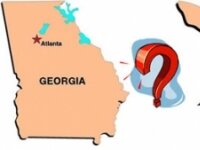Georgia: The state? Or the country?
25 April, 2013
 A lot of people confuse Georgia with the state Georgia in the United States of America. Georgians living in the United States seem to have to explain their nationality twice to avoid misunderstandings about the deep American South. It wasn’t too long ago that ESPN confused the two when Georgia played Spain in a soccer game September 2012. ESPN had a thumbnail flag of the United States in the score bar.
A lot of people confuse Georgia with the state Georgia in the United States of America. Georgians living in the United States seem to have to explain their nationality twice to avoid misunderstandings about the deep American South. It wasn’t too long ago that ESPN confused the two when Georgia played Spain in a soccer game September 2012. ESPN had a thumbnail flag of the United States in the score bar.A couple of years ago in 2008, a couple of American citizens took the internet to share their concerns about Russia invading their state, blissfully unaware that they were on the other side of the world when the conflict was occurring. The Telegraph published a derogatory article in 2008 about their lack of geographical knowledge, quoting the woman who posted a question on Yahoo Answers.
It is a matter that also frustrates a lot of Georgians when they look for “Georgia” through search engines. The resulting pages are mostly of the American state. This makes it difficult to research anything related to the country.
So how far apart are the two Georgias from one another? The two are separated by a drastic 6,310 miles.
The fact that there’s another “Georgia” in this world might further confuse everybody. South Georgia is an island in the southern Atlantic Ocean, joined by smaller islands called “the South Sandwich Islands”. Because it was and still is a British territory, this Georgia was named so in honor of King George III. Quite contrary to the state and country, South Georgia and the South Sandwich Islands have a total population of 30 people as of 2006.
Not to mention, the Georgia in Indiana, New Jersey and Vermont. There’s also a Georgia avenue in Washington D.C. and a street called “Georgia” in Vancouver, Canada.
In 2008, Slate.com published an informational article called “Why Are Georgia and Georgia Both Named Georgia?” with the historical facts behind the two.
It seems like the word “Georgia” strays too far away from the country’s name in its native language: Sakartvelo (derived from “Kartlos”, the ancestor of Georgians according to the Georgian mythology). Both names are radically different. It is said to be derived from a Persian-Arabian origin and related to the name of Saint George.
According to the Georgian Government website, Saint George “was a symbol of united Georgia, i.e. an embodiment and patron of Georgia” and “was first depicted on a big state seal of King George III”.
The American Georgia was named after King George II of England. There happens to be a distinction in the history behind the words.
Georgia is also a female name. According to Sheknows.com, “the meaning of the name Georgia is: Farmer”. It is feminine form of George, which is derived from the Greek “ge?rgos” that means “earth-worker”. It is ranked as no. 312 on the list of popular names in the United States.
Suffice to say there are many Georgias in this world but each has a different historical background as to why they were named so.
Nota Bene by NBR:
Georgian Journal’s own Mariam Makatsaria, corresponding with our Paper from the United States, has interestingly enough noticed the ages-old toponymical inconvenience, bothering us the Georgians both latently and expressly. In some of us an imperceptible trace of exasperation surfaces when we find out that people cannot discern between the two Georgias. I have never had a chance to say what kind of attempts I have made to remedy the nuisance. Mariam has inadvertently triggered my desire to elucidate on the problem if the situation could be qualified as a problem at all. I suggested to Georgia’s first president Zviad Gamsakhurdia – months before he became a chief executive of the country – to try and change the name of ‘Georgia’ into ‘Gheorghia’. He liked the idea but the fortune had it that the name be never changed. This occurred to me when he asked me not to mention on the American television Georgia as ‘Soviet Georgia’ which I was doing to make difference between the two Georgias. I made another attempt to rename Georgia in conversation with several prominent politicians of the nineties of the last century, having proposed ‘Sakartvelo’ (Georgian for Georgia) as the name of the country. Again, nothing happened. As it seems now, the inconvenience will be further perpetuated unless we the Georgians do something outstanding, something of the global significance to make the world think that we are different.





















































